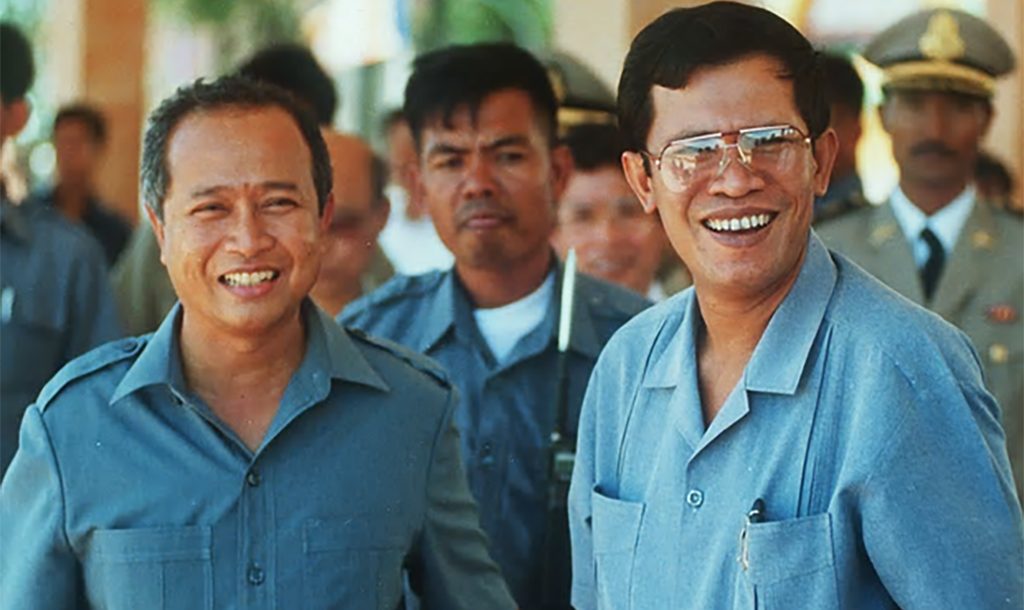As matters of political expediency Hun Sen (CPP) and Norodom Ranariddh (FUNCINPEC) have entered a number of coalitions following disputed elections in Cambodia.
Familiar political patterns are returning in Cambodia. United Nations General Secretary Ban Ki Moon, in intermittent UN fashion, has decried the current political situation in Cambodia, while international donors, most recently in the form of the European Union (EU), have stressed the necessity of tying levels of aid to genuine efforts at political reform.
The UN and the EU are, perhaps, guilty of idealism and naivety. This may seem harsh, but fair when considered against the ruling Cambodian People’s Party’s (CPP) development following the collapse of the Khmer Rouge.
Entrenched political realities, overly optimistic idealism and naivety are also spectres hanging ominously above Sam Rainsy and Kem Sokha, leader and deputy leader of the opposition Cambodia National Rescue Party (CNRP), respectively. More specifically, the “culture of dialogue”, much like previous negotiations and coalitions in the 1990s and 2000s, became a means through which the CPP could look to ameliorate and sedate periods of sustained unrest, as well as create a placid-enough environment in which to defang and decapitate opposition.
In a 2015 interview with the Khmer Times Sam Rainsy, the leader of the opposition CNRP, made an interesting if, in hindsight, overly optimistic assessment of his relationship with Hun Sen. Sam Rainsy referred to the CPP as “adversaries, but in any case, as interlocutors”, suggesting a partnership between the two, before going on to state that: “The CPP was led to respect us because we are strong, much stronger than before, on par with the CPP”. This ‘parity’ was questioned then and continues to be questioned now.
In the same interview Sam Rainsy referred to a change in the “political situation” in Cambodia, one which saw the consolidation of a two-way contest between the CPP and CNRP, as well as an outpouring of support, particularly young support, for the opposition. However, Sam Rainsy failed to fully appreciate what remained the same or proved more resilient to change.
Throughout the 1980s and 90s the CPP’s forerunners built administrative and political structures, making the state apparatus, civil service, police and military inseparable from the party. This extended to top-down control of the judiciary. The abandonment of the planned economy resulted in a transformation of the patronage system rather than its demise, with ‘gifts’ being distributed to political loyalists. Today, Hun Sen and the CPP remain heavily invested and entrenched in state and political institutions, as well as the economy.
When it came to engagements with organised electoral opposition parties, the CPP was able to negotiate from a position of strength – wooing then undermining. During negotiations following the 1998 election the CPP, while expressing a willingness to talk with FUNCINPEC, insisted on maintaining control over the key ministerial portfolios of finance, justice, foreign affairs, security and defence. This had echoes in 2013 when the ten parliamentary commission were split between the two parties. The CNRP was granted the anti-corruption committee while the CPP maintained finance, the interior, foreign affairs and justice.
Entering into coalition with the CPP contributed to the royalist party FUNCINPEC’s irresistible fall into political irrelevance. Crippled by internal rivalries and charmed by the promise of lucrative positions, FUNCINPEC became a puppet of the CPP, even supporting the controversial ‘package vote’ – the party’s vote plummeted in 2008.
The CNRP may prove itself to be more resilient than FUNCINPEC and less susceptible to trading political conscience for lucrative contracts. Still, the current trajectory is worrying. As an arrangement of informal chats and conversations, not forgetting early concessions such as the reform of Cambodia’s electoral commission, the ‘culture of dialogue’ is poorly institutionalised. For the CPP, political coalitions and the culture of dialogue are cut from the same cloth – temporary measures to be discarded when opportunity arises.
The culture of dialogue has been one political casualty among many in previous months. The CPP continues to use the incumbency advantages amassed over decades of power. Sam Rainsy, Kem Sokha, CNRP members and activists, as well as human rights campaigners are feeling the brunt of this.
Sam Rainsy’s wide-eyed idealism has run thanklessly against the grain, lit only by symbolic gestures and mirages of political equality with the CPP, such as the post of ‘Minority Leader’. Now, he and Kem Sokha may feel themselves trapped in a Kafka-esque nightmare – estranged, unfairly treated and deceived by an (albeit visible) authoritarian power. That said, the lessons of history were not on their side, a fact, even in their most optimistic moments, they must have known only too well.
The rules of political engagement, under whatever name, are more often than not defined by Hun Sen and the CPP. They are typically self-serving, matters of political expediency rather than sincere efforts at power-sharing.
Already bruised and beaten, and with National Assembly elections still two years away, will the situation become still worse or better for Sam Rainsy, Kem Sokha and the CNRP?
Scott Rawlinson received his MA in South East Asian Studies from the School of Oriental and African Studies (SOAS), University of London. He is a Fellow, and Coordinator for Fellows, at the Cambodian Institute for Strategic Studies (CISS), Phnom Penh. All opinions are those of the author and do not necessarily reflect the views of the Institute.
 Facebook
Facebook  Twitter
Twitter  Soundcloud
Soundcloud  Youtube
Youtube  Rss
Rss 